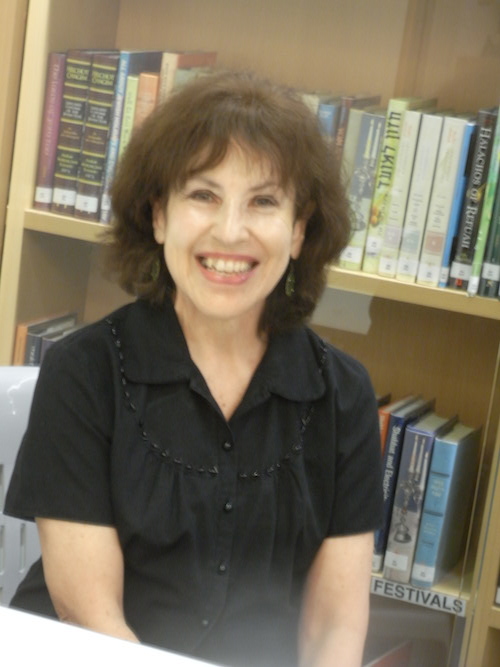Thanksgiving
08/11/2016 03:29:06 AM
| Author | |
| Date Added | |
| Automatically create summary | |
| Summary |
This year the American Thanksgiving holiday will take place on Thursday, November 24th. I want to tell you a little bit about Thanksgiving and about Jewish views of the holiday. Thanksgiving is the biggest holiday in America, even more popular and observed than Christmas, where most families gather together and share a meal, almost always with turkey as the main course. The holiday falls on the fourth Thursday of November and many people take Friday off, making a 4-day weekend. There are big sales and it marks the beginning of the Christmas shopping period. Everyone watches the Macy’s parade in midtown Manhattan and American football games on TV.
The first permanent settlers in America were the Pilgrims in Massachusetts in 1620. They celebrated their first harvest, where they had help from the local Indians, and invited these Indians to join them. Many communities and colonies instituted similar harvest celebrations during the 1600s. George Washington proclaimed a national thanksgiving day for November 26, 1789 for the adoption of the Constitution. The United States did not continue to celebrate a national holiday after this, but many states, especially in New England, maintained annual observances with a Thursday day of prayer and family homecoming each autumn. In 1863, during the Civil War, Abraham Lincoln proclaimed Thanksgiving a national holiday, with the following proclamation:
“The year that is drawing towards its close, has been filled with the blessings of fruitful fields and healthful skies. To these bounties, which are so constantly enjoyed that we are prone to forget the source from which they come, others have been added, which are of so extraordinary a nature, that they cannot fail to penetrate and soften even the heart which is habitually insensible to the ever watchful providence of Almighty God.”
Thanksgiving has been celebrated as an American national holiday ever since Lincoln. The sombreness of Lincoln’s Civil War holiday was replaced with gaiety and public activities in the late 1800s. In 1921 Gimbel’s department store in Philadelphia sponsored its first Thanksgiving parade. A few years after Macy’s in Manhattan responded with its parade along Broadway. These days the Macy’s parade shares the limelight with several big games of American football.
The holiday was usually set for the last Thursday of November. In 1939 business interests successfully lobbied President Roosevelt to move the holiday forward by a week to have a longer Christmas shopping season. Two years later Congress passed a bill designating the fourth Thursday in November as America’s official Thanksgiving.
Nearly all Jews in America celebrate Thanksgiving, which is seen as a secular holiday representing values important in Judaism and American culture. But halachic issues have been raised, stemming from an understanding of the Jewish prohibition to imitate Gentile customs, found in Leviticus 18:3:
“After the doings of the land of Egypt, wherein ye dwelt, shall ye not do; and after the doings of the land of Canaan, whither I bring you, shall ye not do; neither shall ye walk in their statues.”
The first two parts of the sentence refer to corrupt practices, first by the Egyptians, then by the Canaanites. The third part – u’vchukosaychem lo saylchu – is harder to understand. Rashi gives two different explanations. First, “it refers to their social customs – things which have assumed for them the character of a law as, for instance, the frequenting of theatres and race-courses.” The alternative explanation is given by Rabbi Meir who said that these (chukosaychem) refer to the “ways of the Amorites” meaning superstitious practices.
Let’s look at how three great rabbis of the modern era have approached the matter. Rabbi Moshe Feinstein published four responsa on issues relating to celebrating Thanksgiving. The first one considers whether it is okay to schedule a wedding then. He rules that if the holiday is based on Gentiles’ religious beliefs, then it is prohibited to deliberately choose that day. He says that Thanksgiving is not prohibited according to law but that pious Jews should be strict and avoid scheduling simchas then. In subsequent rulings he clarifies his understanding that Thanksgiving is not, in fact “a religious holiday and that one is not obligated in a meal, and since this is a day of remembrance to citizens of this country...halacha sees no prohibition in celebrating with a meal or with the eating of turkey.”
Rabbi Joseph Soloveitchik, the Rav, was Rosh Yeshiva at Yeshiva University in Manhattan but lived in Boston, commuting weekly. On Thanksgiving Day he started his shiur early so that he could catch a 2.00pm flight to Boston to have a festive meal with his family. One time, though, exactly 40 years ago, he and his class spent five hours working through a difficult Tosafot. When an aide reminded him that he had to leave for the airport, the Rav turned and said, “no one can leave here until we have understood what it is that Tosafot is saying.” According to Soloveitchik, Thanksgiving is not a Gentile holiday and it is permissible to eat turkey, but the occasion does not take precedence over other obligations.
Now let’s contrast the position of the Lubavitcher Rebbe, Menachem Mendel Schneersohn. In a famous talk that he gave 30 years ago, he explained why he and Chabad loved and embraced and celebrated Thanksgiving. He spoke in Yiddish, but I quote him in translation at length:
The foundation of this nation was laid by the Founding Fathers, who after coming to this country proclaimed a holiday of Thanksgiving to G-d, Creator and Director of the world, for having saved them and bringing them to a secure land where they could live free of oppression and decrees–to live as they see fit, beginning from practicing their faith in G-d as Creator and Director of the world, in their own times, in their own lives, and their own rescues. They even established it as a law that every year on that day, it must be remembered again, to thank G-d from the depths of our hearts, for having shown them His kindness openly.
It has been established even for non-believers – who in their hearts believe as well, but for whatever reason, boast that they do not believe, or they believe that G-d is far away, somewhere in the Seventh Heaven. But even they know that when a matter affects them seriously, they pray to the Superbeing, to G-d, for help. And certainly, they participate in the Thanksgiving celebration for the founding of this nation by the first gentiles who arrived here.
. . . [A]lthough there were Jews among them, the majority, who established Thanksgiving, were non-Jews. This faith has been celebrated from generation to generation, including our own generation. . . .
[T]he Founders began their life in this country by thanking G-d. . . . This is the foundation of this country, to save the righteous from the hands of evil.
And Chabad puts this into practice. Every year they host kosher turkey dinners in cities all over America, feeding the less fortunate; most of the people who come to these dinners are not Jewish
Many rabbis in America give sermons on the subject of Thanksgiving. Rabbi Norman Lamm, former president of Yeshiva University and congregational rabbi at The Jewish Center on the Upper West Side of Manhattan, concluded one such sermon as follows:
“It is this thoroughly Jewish idea — the dual nature of hodayah [(1) thankfulness and (2) a confession of guilt] and the inexorable failure and mortal danger of human ways without God that should be our specific Jewish contribution to the American experience of Thanksgiving. It is for this reason that, to my mind, Thanksgiving Day is so much more precious than other national holidays. Other patriotic occasions, such as Independence Day, valuable though they are, can easily degenerate into national self-idolatry and collective self-glorification. In order to re-establish the proper harmony we need the kind of corrective of humility inspired by Thanksgiving Day. For if July 4th is Independence Day, then Thanksgiving is our Dependence Day — our dependence upon the Almighty. Let this, then, be our prayer: Almighty God, as we rely upon Thy guidance, recognizing our unutterable debt to Thee as hayyavim [undeserving]. You lead us out of the midbar [desert], spare us from the listim [bandits] who would unleash unspeakable terror upon all men, and from the hayyot ra’ot [wild beasts] that lurk unpredictably in the hearts of each of us. May all our derakhim (ways) be safe from sakkanah (danger), and may they all lead to a greater and better future for all of us, all America, and all mankind.”
This is a time to give thanks, to recognise that God is the source of our bounty, to be humble and to pray for a good future.
Mon, 25 August 2025
1 Elul 5785
Contact Us:
Today's Calendar
| Rosh Chodesh Elul |
| Shacharis : 6:30am |
: 9:10am |
: 5:30pm |
| Mincha : 5:35pm |
: 5:57pm |
This week's Torah portion is Parshas Shoftim
| Shabbos, Aug 30 |
Candle Lighting
| Friday, Aug 29, 5:17pm |
Havdalah
| Motzei Shabbos, Aug 30, 6:13pm |
Rosh Chodesh Elul
| Monday, Aug 25 |
Full Calendar Here
Happy Jewish Birthday!
Monday 1 Elul
- Toby Levine-Evans
We wish "Long Life" to:
Monday 1 Elul
- Elaine Bolon for father, Gerald Sender
Wednesday 3 Elul
- Cecille Levin for husband, Gerald Philip Levin
- Gary Weiss for uncle, Berl Yisosko Dov Frankl
Halachik Times
| Alos Hashachar | 5:09am |
| Earliest Tallis | 5:38am |
| Netz (Sunrise) | 6:23am |
| Latest Shema | 9:10am |
| Zman Tefillah | 10:06am |
| Chatzos (Midday) | 11:58am |
| Mincha Gedola | 12:25pm |
| Mincha Ketana | 3:13pm |
| Plag HaMincha | 4:22pm |
| Shkiah (Sunset) | 5:32pm |
| Tzais Hakochavim | 5:57pm |
| More >> | |
South Head Catering

South Head Catering is well and truly on the map! What began as a small initiative to provide a little variety and some new options by the South Head Ladies Guild has turned into a highly successful venture with people absolutely raving about the service and products on offer.
Want to know more? Want to help out and volunteer? Visit our Catering page.
Mikvah Aziza
Mikvah Aziza at 662 Old South Head Road, Rose Bay has re-opened.
Please click here for details:
South Head Library
 Welcome to the Sandra Bransky Library & Youth Synagogue, located on the first floor and including the Beit Midrash. Drop in any Sunday morning between 9 - 11am.
Welcome to the Sandra Bransky Library & Youth Synagogue, located on the first floor and including the Beit Midrash. Drop in any Sunday morning between 9 - 11am.
I look forward to helping you get the most out of our beautiful world of books at South Head.
Sylvia Tuback, South Head Libarian
southheadlibrary@gmail.com
SHOFTIM
Rose Bay, NSW 2029
(02) 9371 7300
Privacy Settings | Privacy Policy | Member Terms
©2025 All rights reserved. Find out more about ShulCloud



